
A lawsuit is a formal legal way to compel a negligent party to pay for the damages they inflicted in an accident. In many cases, truck accident cases will go to trial because of factors regarding circumstance, evidence, and willingness to negotiate.
In a California truck accident lawsuit, you may be seeking compensation from other parties than the driver who hit you. The additional persons involved in truck accident proceedings can make the case more complex to bring to a conclusion.
An attorney serves as an invaluable resource during your lawsuit, helping you prepare for all steps of the suit, including out-of-court negotiations and presentation of evidence to a jury. While the average person may be able to settle a truck accident insurance claim without professional legal help, handling a court case is a completely different matter.
Having an attorney enables you to handle the process with less stress and seek the optimal outcome using the sum of your legal knowledge and experience.
Singh Ahluwalia Attorneys At Law is a firm that is dedicated to advocating for accident victims and their financial well-being. We want to help you move forward from a truck accident with minimal risk of having to pay for your own damages out-of-pocket.
Representation is a call away. Schedule a free case review with a California truck accident lawyer today when you call 559-878-4958 or contact us online.
Proving Negligence in a Truck Accident Lawsuit in California
To recover a settlement (or jury award) after a California truck accident, you’ll need to prove that another involved party’s negligence is what caused the crash.
Negligence may be more complex to prove than expected, especially when other entities aside from the trucking company and their employees are involved.
For example, the owner of the cab or trailer may have serious mechanical issues, which should have been picked up by routine inspections that are mandated by federal law. Yet, the Federal Motor Safety Administration reports that for commercial trucks, maintenance issues are a factor in roughly 40% of accidents.
In order to be considered partially or totally liable for an accident’s damages, the victim must be prepared to demonstrate four main legal points of negligence.
The four elements of negligence are as follows:
- Duty of care — The responsibility of the trucking company (or another party) to follow laws and exercise normal “reasonable” care in order to prevent an accident
- Breach of duty — An act or omission that could be considered a violation of the at-fault party’s obligation to exercise appropriate care
- Direct (proximate) causation — An injury occurred, and the at-fault party’s breach of their duty is the most direct reason for the injury.
- Damages — The injury or harm in question must have led to quantifiable damages, which can be recovered in a court of law.
A general pattern of negligence, such as not drug testing, ignoring hours of service regulations, and failing to background check, may be sufficient in proving negligence.
A commercial driver is supposed to undergo a thorough background check, one that covers more than criminal and employment history. Similarly, a hiring company will need to ensure that their potential driver has completed all of the necessary training and has the correct licensing.
They must also conduct regular drug screenings and enforce mandatory rest breaks in between driving stints.
If failing to do any of the above led to an accident, then the negligent company could be considered at fault for the resulting damages.
Possible At-Fault Parties in a Truck Accident
When seeking out financial compensation from a truck accident, there may be one or more liable parties who will have a hand in reimbursing the cost of damages, including the following:
- The trucking company: The company that employs the driver will be financially responsible in the event their employee or their own negligence causes an accident. Their commercial insurance policy is the first avenue for recovery. A trucking company that is only responsible for the vehicle and not the driver may also be responsible if the vehicle had a defective part, was improperly maintained, or otherwise shouldn’t have been on the road.
- Independently contracted driver: Many trucking companies will try to avoid liability by claiming that the driver was an independent contractor (IC). In reality, many truck driver ICs are misclassified employees. The trucking carrier may ultimately be responsible for their conduct and, thereby, the damages they cause. If the situation involves a legitimate IC, then that driver should have their own liability policy available to cover damages for a road accident.
- Cargo loading company: The loading company is another separate entity that hauls the goods in and out of the trailer at its destination. If the vehicle was improperly loaded, an accident victim may need to seek compensation from their insurer.
- Maintenance provider: Anyone who is responsible for maintaining the drivability and safety of the truck may also be held responsible in an accident. A review by the Federal Motor Carrier Safety Administration found that brake issues alone are reported in almost 30% of trucks, and they account for many accidents. When maintenance is neglected or carried out improperly, a truck can create significant hazards on the road.
What if the Commercial Driver Was an Independent Contractor?
Even in cases where a trucking company claims their driver is an independent contractor, they may hold liability for damages caused by the accident.
The misclassification of truck drivers as independent contractors is a considerable problem in the industry. The PRO Act (Protecting the Right to Organize Act) is a bill that highlights some of the questionable business practices in the trucking industry, like being employed without benefits – i.e., the independent contractor loophole.
Independent contractors are supposed to have their own independent insurance policy to cover liability in the event of a crash, so failing to ensure that their hired driver is following this regulation can be a detrimental mistake for their case.
What Are the Steps to Filing a Truck Accident Lawsuit in California?
When all other methods of recovering compensation have been exhausted, an attorney can represent you through the steps of formal litigation:
- Prepare for a lawsuit: Before a formal suit is filed, an attorney will begin to gather evidence, prepare all legal arguments, and compile relevant information regarding the case law. In some situations, an attorney may even utilize the opinions of expert witnesses and reconstruction analysts when developing a strategy for the upcoming proceedings.
- Discovery: The discovery phase of a lawsuit is when both parties present and exchange evidence relevant to their arguments. There may be written questions, oral depositions, and subpoenaed documents during the discovery period. Your attorney can prepare you for any responsibilities you have throughout this step of litigation.
- Mediation: Mediation is an informal negotiation process where a neutral third party, known as the mediator, will hear evidence and help all involved parties make an agreed-upon decision. This individual does not have any decision-making authority but instead assists those involved in communicating more efficiently.
- Arbitration: This is a more formal process, and the neutral third party, known as the arbitrator or panel of arbitrators, does have decision-making authority in the matter. Their decision may or may not be binding, but if the parties involved are unhappy with the outcome, they may still pursue litigation. Arbitration is still more of a relaxed process compared to a formal trial and can be conducted privately, which is why a lawyer may recommend this option first.
- Trial: If none of the previous processes for reaching an agreeable settlement are successful, the case will proceed to trial. During a trial, both parties will have the chance to present evidence, bring witnesses forward, and make legal arguments for the judge/jury, who will make the final determination and settle the case.
- Appeals (only if necessary): Both parties have the option to appeal the case to a higher court if they are dissatisfied with the outcome. This process includes reviewing the legal arguments presented to determine if any critical errors were made, warranting a new trial. An appeal will generally involve a legal matter regarding case law, not the facts presented in the case. In the event your case is appealed, an attorney can represent your best interests through the additional litigation.
A Truck Accident Attorney Can Help You Understand Your Options for Financial Recovery
A lawsuit is generally the last resort for a truck accident victim as they seek to recover financially from their injury costs. However, suing someone may be necessary, so your case should always be prepared with that possible outcome in mind.
An attorney can help manage your case from start to finish, preparing you for the possibility of a lawsuit if it becomes a reality. Singh Ahluwalia Attorneys At Law has associates standing by to speak with you and schedule a free, confidential case review with a California truck accident attorney.
Schedule your free case evaluation when you call 559-878-4958 or contact us online. For our client’s convenience, we speak English, Punjabi, Hindi, and Spanish.


